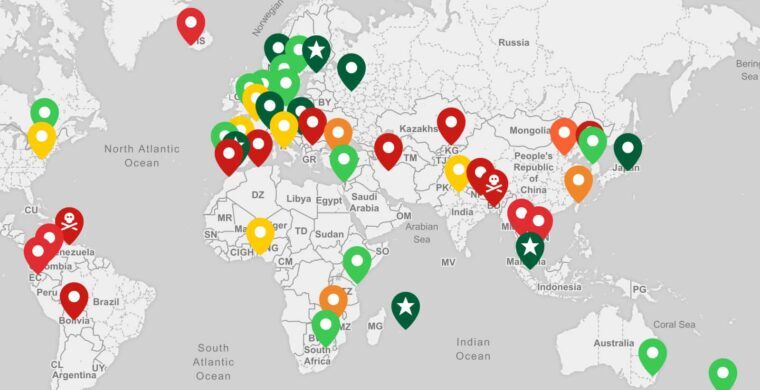To assess a country’s stance on technology and innovation, it is essential to examine the level of crypto adoption and the overall sentiment of the country and its people toward blockchain technology.
Crypto-friendly countries are characterised by a supportive regulatory framework and infrastructure that facilitate the use and acceptance of crypto. It acknowledges crypto as a legitimate currency, implements favorable regulations, ensures easy accessibility, and promotes innovation and education in the crypto industry.
However, it is worth noting that crypto regulations are not static and may undergo changes over time, leading to variations in a country’s crypto-friendliness.
What countries accept cryptocurrency? Where is the best environment for DeFi? The article will introduce cryptocurrency legal countries list 2024.
Countries Using Bitcoin and Other Cryptos

Crypto adoption globally reaches new highs every day. Let’s talk about the top 5 most crypto-friendly nations.
Malta
Known as ‘Blockchain Island,’ Malta is an ideal location for cryptocurrency investments. With its favorable regulatory environment, popular exchanges like Binance operate smoothly in the country and across the European Union.
Investors and traders can enjoy the benefits of tax-free long-term capital gains, while short-term gains are subject to a tax rate between 0-35% based on income.
Additionally, the government of Malta actively supports cryptocurrency as an alternative to traditional currency, allowing you to use crypto to purchase goods and services.
Germany

Germany stands out as one of the most welcoming countries for crypto investments. In terms of taxes, if you hold your crypto investments for more than a year, they will not be considered capital assets.
Instead, they will be treated as private money, resulting in no taxes being owed. This means there are no taxes on long-term crypto gains, and short-term gains below €600 are tax-free.
Additionally, if you hold onto your crypto for more than ten years, you will not be subject to any tax obligations. With its lower cost of living index and lenient crypto tax laws, Germany is an ideal destination for casual crypto investors and those looking to hold onto their investments for extended periods.
Portugal
Portugal, a country known for its stunning beaches, offers a unique opportunity for tax-free crypto investments. Whether you’re a trader, buyer, or seller of crypto, you’ll enjoy the benefits of not paying taxes. This includes exemption from VAT and income tax, making it a valuable option for individuals.
However, businesses may be subject to a potential flat tax rate of 28% on short-term gains from crypto transactions. Stay informed and consult the most up-to-date tax guidelines if you consider establishing yourself in Portugal.
Switzerland

Switzerland, known for popular crypto projects like Ethereum and Bitcoin Suisse, is also home to the world’s leading blockchain ecosystem, Crypto Valley. Switzerland is a crypto hub with favorable crypto tax policies and a thriving economy.
While there is no capital gains tax, mining is subject to taxation. It’s important to note that the value of your crypto assets will be taxable, regardless of whether you are a private investor or a business entity.
In efforts to promote the adoption of virtual currencies, the city of Lugano in Switzerland has taken a progressive step by accepting taxes in cryptocurrency. This move highlights the country’s commitment to embracing digital currencies.
Japan
Japan, an early adopter of crypto, embraced BTC in 2017 and has since licensed numerous crypto exchanges. This has led to a surge in businesses accepting digital currency payments, making it convenient for consumers to use BTC throughout the country.
If your crypto profits for a financial year total less than 200k JPY, you are exempt from paying taxes. For earnings below 1.95M JPY, the income tax rate is only 5%.
Recognizing the potential of blockchain technology, the Japanese government initiated a pilot project in 2016 to enhance the transparency and efficiency of its administrative processes. Encouraged by the results, the government actively supports the development of blockchain technology through partnerships with private companies and institutions.
Indicators To Recognize Crypto-Friendly Countries

A country where crypto is accepted establishes a regulatory framework that supports it. Here are three key factors that determine if a country is crypto-friendly:
- Legalization of Crypto: Countries like China, Bangladesh, Indonesia, and Egypt have banned crypto. To be considered crypto-friendly, a country must first accept and legalize crypto.
- Minimal Taxes: In Bitcoin-legal countries, taxes are typically applied to investments. However, crypto-friendly countries have either zero or very low capital gains taxes on trading and investments.
- Supportive Regulations: Crypto-friendly countries have favorable tax policies and a regulatory environment that encourages the growth of crypto businesses. This means creating a system that supports and nurtures the development of cryptocurrency ventures.
Bottom Line
Cryptocurrency is a divisive topic among governments worldwide, leading to varying perspectives and tax policies. While some countries impose multiple taxes on digital assets, others offer tax-free opportunities for crypto investments.
Therefore, if you operate a crypto business, it’s crucial to consider establishing your headquarters in a crypto-friendly nation.
